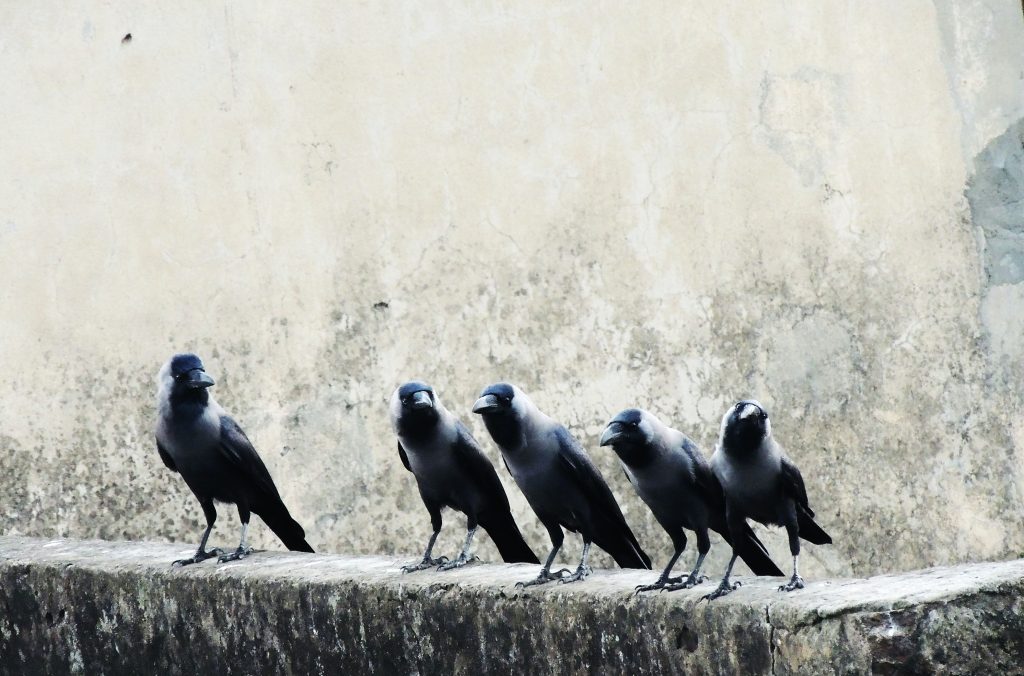
A Mountain Festival to Thank the Crows
In villages across Kumaon in Uttarakhand, locals make edible garlands and celebrate crows in the Ghughuti festival
“Kale kauve, kale kauve, ghughuti mala khaale!”
Black crow, black crow, come eat your ghughuti garland!
This gusty call to summon crows echoes across Kumaon on the first day of the month of Magh* (around 15th January) each year. Children wake up early, bathe and get ready for the Ghughuti festival.
I too, wake up at 4 am, while the sun is yet to rise from behind the Panchachuli mountains across my village of Sarmoli. In the bitter cold, I give the mud plastered floor of the kitchen and courtyard a quick mud wash or lipai, then bathe and light the lamp in my temple room. By one o’ clock, my ghugutis are ready – made by kneading wheat flour with jaggery and ghee in milk, then deep frying them in oil.

Each year, as I make garlands of ghughutis and give them to the children of my village, I fondly remember my mother’s home. As a child, I would wake up early, visit my neighbours to collect ghughuti garlands and feel overjoyed when somebody gave me one! Then we would gather at home as our mother related the tale of how the Ghughuti festival began.

Many many years ago, Kumaon was ruled by King Kalyan of the Chandra dynasty. He was childless and worried about who his heir would be. One night, Lord Bagnaath appeared in his dreams in the form of Lord Shiva, and said to the King: “If you build a temple in my name, a child will be born to you.”
The king and the queen were elated, and built a temple which is situated in Bageshwar and can be visited to this day. The boy they bore grew and grew like the waxing moon of the Shukl Paksh**. The king and queen lovingly named him Ghughuti. A garland of bells (similar to a ghungroo) was placed around the child’s neck and that too was called Ghughuti. When Ghughuti, the boy, acted naughty, the queen would teasingly say she’d give his garland to the crows. That quietened down the boy.

Unfortunately, there was a minister in the king’s court who secretly wished to inherit the kingdom and become the next king. To fulfill his ambition, the minister hatched a plan to kill Ghughuti.
One day he lured the child and took off to the jungle with him. It so happened that the crows caught a glimpse of the minister sneaking out of the palace with the child. And wherever the minister took the child in the deep jungle, the crows would follow and screech kawn- kawn! At an opportune moment, one crow swooped down and snatched the ghughuti around Ghughutis’s neck and flew off with it to the king’s palace.
The king and queen were besides themselves with worry because Ghughuti could not be found anywhere. The king suspected that the minister, who was given to excessive flattery, was very ambitious and seemed to be jealous of Ghughuti, must have done something. The king sent all his ministers and royal guards in search of Ghughuti.

When the ministers caught sight of the crow with the garland of bells in its beak, they informed the king and queen, who were sure the crow bore good news. The crow then led them to where Ghughuti was hidden. The kingdom was overjoyed on having found the child. The king and queen bowed to the crow repeatedly and punished the minister who had plotted to kill Ghughuti.
In celebration of Ghughuti’s return, the royal couple threw a lavish banquet. This was the last day of the month of Paush, and the crows were to be fed first. But as evening fell and it got too late, the crows could not attend the feast that day. So the crows were especially invited for the feast the next day – the first day of the month of Maagh.

To this day, we show our appreciation to the black crows through the Ghughuti festival. The first dishes of the day are cooked in their honor, and fed to them when they answer the summoning calls across Kumaon. Children then roam the village with their edible Ghughuti garlands draped around their necks, nibbling away at it all day.

Children from Sarmoli happy to be wearing their Ghughuti garland. Photo: Rekha Rautela 
Nibbling away at the Ghughuti garland. Photo: Trilok Rana
*Maagh is the eleventh month of the Hindu calendar, which corresponds with January / February of the Gregorian calendar.
**Shukl Paksh is the phase of the moon when it is waxing or growing till it is full moon.
Read the original version of this story in Hindi
Meet the storyteller








Thanks to Shivya Nath, we feel privilege to get an opportunity to Stay with Kamla Pandey’s Homestay for a week. We still treasurer our time spent at her home, but we missed her Stories.
Such a lovely story! It’s great that we have a platform lie this, where storytellers can share their beautiful stories and connect with us. The beauty of a place lies in the stories of these wonderful people.
Lovely story to hear and to share it with our kids. I would love to visit shamoli in the month of Maagh
I remember.meeting Kamaladi when I stayed in Sarmoli guest house arranged for us by Mallika Virdhi….But never knew about her stories…My next visit and she has to spare some time narrating us one of her new story…… Beautifully said….Mallika great job….
Thanks for sharing this lovely story Kamala !